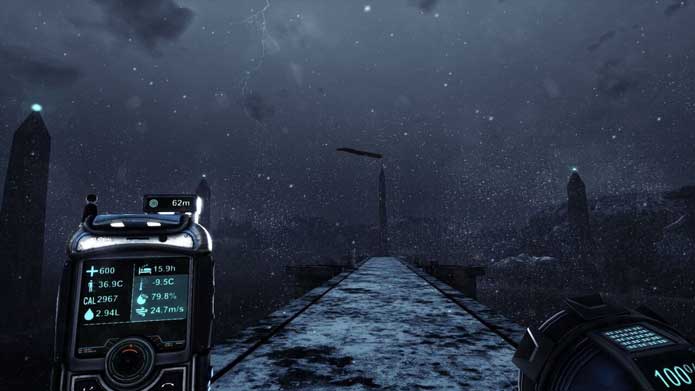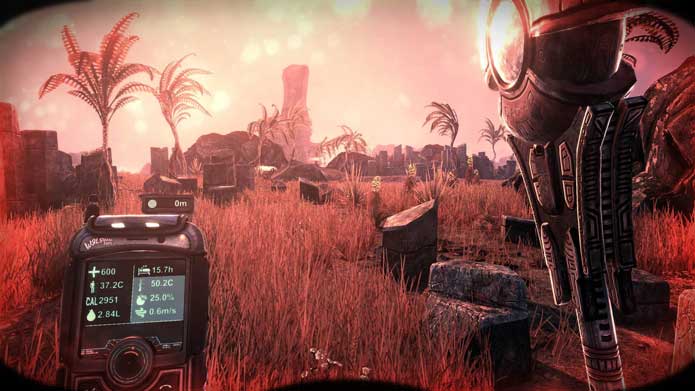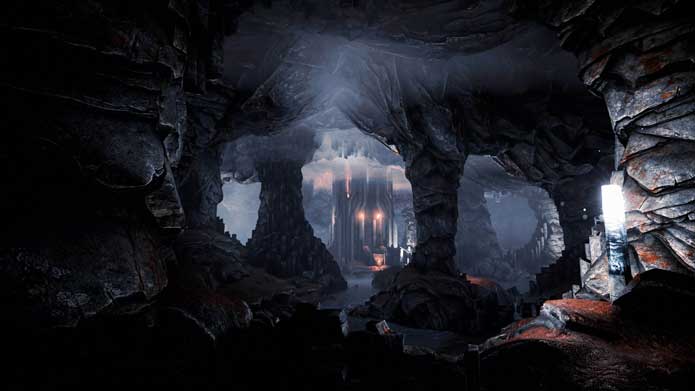The Solus Project Game Review – It is a survival game with a mysterious story to tell
Earth is a goner, so humanity takes to the stars, with what’s left of the human race hanging out near Pluto. From there you’re shipwrecked on an even more distant planet while looking for a suitable colonization site.”You are completely and utterly alone on the deserted planet Gliese-6143- C,”
“You will have to unravel the mysteries surrounding the disappearance of an ancient alien race, survive the harsh and hostile environment of the seemingly deserted planet and find a way to send a signal home, to finally save humanity.”
The Solus Project puts you in the shoes of a sole survivor. With nothing more than debris, an AI handheld and the ability to craft items together you must face the unknown.

Facing all the usual issues associated with surviving which include lack of food, water, weather conditions, shelter and temperature fluctuation,Solus Project turns quickly from an inhospitable locale to something altogether more interesting.
The story is delivered through brief and infrequent monologues, and through stone tablets that your computer-like device translates. Much of the storytelling is also conveyed through audio logs your protagonist records. But despite the fact that you come across notably crazy sights, your character almost never acknowledges them when delivering her verbal assessments, focusing instead on minor, seemingly mundane details.
While there isn’t any combat to speak of, you are in a constant battle to survive, and it’s crucial that you stay on top of your hunger, thirst,fatigue, and body temperature. You regain health by sleeping or consuming special items.
Monitoring temperatures is a critical task as it’s easy to succumb to hypothermia or heat stroke, which can quickly put your life in jeopardy. With the right supplies, you can generate heat or cold as needed.

Despite having to manage a host of physical conditions, survival comes easy as long as you pay attention, which unfortunately undermines any feelings of desperation the game attempts to evoke.
Your primary objective during missions is typical to get from point A to point B, and though you regularly come across puzzles or obstacles, they’re usually easy to resolve. You have access to tools that can help you complete certain puzzles, like a hammer that can break down walls or a teleport device that shoots discs you can teleport to.
Some puzzles can be solved through remembering patterns, while others require you to use the teleport device. However, my solutions often felt like I was cheesing my way through the game. In a lot of cases, I would hammer the jump button to slowly but surely make my way up a mountain or constantly shoot the teleporter discs until one finally made it through a crack or over a wall, which would allow me to teleport to them, then move on. Instead of feeling smart after solving a puzzle, I felt like I achieved the solution by pushing on something over and over until it worked.
However just because it failed to float my boat means very little as the games I normally go for involve lots of driving. As an afterthought if you were to take Solus and Elite: Dangerous, combine them and release that as one game then you might well have the perfect exploration experience.

The Solus Project tries to bring story and survival together in an engaging way, but it ultimately falters in this attempt. It has moments of wonder, but they’re divided by what is mostly monotonous wandering from place to place. It’s a disappointing game with a lot of missed potential, and it doesn’t convey a good story or the rewarding feeling of surviving against the elements.

















































